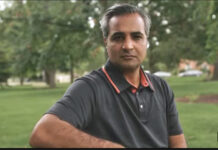
By Morningstar News
A Christian woman in Sweden has been unable to find work as a midwife since a hospital where she interned last year let her go for refusing to help perform abortions.
Hospital officials in the southern town of Eksjö had promised to extend Ellinor Grimmark’s contract until she refused to participate in abortions last summer, she said. Another hospital agreed to hire Grimmark but then reneged due to her convictions and the controversy growing over them; and
no other hospital would hire her in spite of a shortage of midwives in Sweden, she said.
“They have said that because I do not perform abortions, I cannot work as midwife,” Grimmark told Morning Star News, referring to both the hospital that let her go and prospective employers. “In my contact with my employer or a prospective employer, I have talked very carefully about my inability to perform abortions based on my Christian faith, my sincere religious conviction. My employer has not been willing to discuss the issue further.”
Grimmark, a 37-year-old wife and mother who has since found work as a nurse, has filed a complaint with Sweden’s Discrimination Ombudsman (DO). Attorneys with human rights group Provita and religious
liberty organization Alliance Defending Freedom are helping Grimmark in a case they hope will help establish protections for freedom of conscience in Sweden.
Grimmark, of Tenhult, said she had prepared for work as a midwife with the understanding that the primary responsibility would be to help deliver babies, though she was aware that hospital work in Sweden could conflict with her convictions.
“I knew it could be a problem, but I was hoping for a supportive employer that would be willing to help me and grant me the right to freedom of conscience,” she told Morning Star News. “But unfortunately, I have encountered a very negative attitude and a direct unwillingness to resolve my case. They answered me that, ‘Someone with your opinions has no place at our clinic.’”
Sweden has no comprehensive and clear legal and policy framework regarding freedom of conscience, said Provita CEO Ruth Nordström. She noted, however, that the European Convention on Human Rights (ECHR, formally European Convention for the Protection of Human Rights and Fundamental Freedoms) offers protections, and that they are legally binding in Sweden.
“Ellinor Grimmark is denied the right to exercise the most basic manifestation of Article 9 of the ECHR,” Nordström told Morning Star News. “Her employer has not complied with either the Swedish Discrimination Act’s prohibition against direct or indirect discrimination, or the requirement of a general obligation to cooperate with the employee ‘to achieve equal rights and opportunities in working life regardless of religious belief, and in particular to combat employment discrimination on such grounds.’”
A 2010 resolution should greatly affect how the European Court of Human Rights interprets the ECHR articles, she said.
“European case law protects religious manifestation and maintains a right to freedom of conscience, which is strengthened by the Council of Europe resolution 1763 of conscience for health care workers and the protection of freedom of conscience in health care among member states in Europe,” Nordström said.
The case has sparked debate in Sweden, where a woman may obtain an abortion for free at up to 18 weeks after conception, and in some cases 22 weeks. Asserting that legal protections of freedom of conscience would result in violations of the right to an abortion in Sweden, many fear women seeking abortions would run into a shortage of those willing to perform them.
Among those voices is that of the Swedish Association of Health Professionals, whose vice chairwoman, Pia Arndorff, told TT news agency, “As a patient in Sweden, it must be very clear what you can expect according to Swedish law. It should not depend on whom you happen to encounter.”
Sweden and Finland are said to be the only two members of the 47 Council of Europe states without well-defined freedom of conscience measures.
“In the majority of Council of Europe member states, the freedom of conscience is well regulated in national legislation,” Nordström said. “In some countries, the right to freedom of conscience is implemented in the constitution.”
Resolution 1763, which the Council of Europe Parliamentary Assembly adopted on Oct. 7, 2010, implies the right to conscientious objection in lawful medical care, she said. It stipulates that “No person, hospital or institution shall be coerced, held liable or discriminated against in any manner because of a refusal to perform, accommodate, assist or submit to an abortion, the performance of a human miscarriage, or euthanasia or any act which could cause the death of a human fetus or embryo, for any reason.”
Sweden has been accused of non-compliance of several counts related to freedom of conscience before the European Council of Social Rights. In March 2013 the Federation of Catholic Family Associations in Europe filed a complaint with the Council delineating the counts, and attorneys hope Grimmark’s case could also help bring Sweden into compliance with Council of Europe standards.
Provita’s Nordström, who also serves as president of Scandanavian Human Rights Lawyers, said Grimmark could win a case in the European Court of Human Rights.
Grimmark said she felt hospitals in Sweden spurned her for her Christian convictions. “I believe that life starts at conception,” she said. “I do not believe that a man may decide over life and death. I believe there is a plan for every person’s life even before birth.” –Morning Star News



